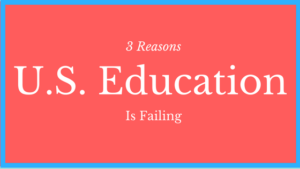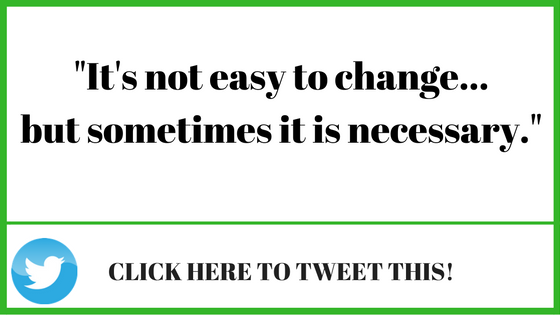 Let me admit…
Let me admit…
Before I start I want to readily admit that there are far more than 3 things wrong with our current educational system. The 3 reasons I’m about to discuss are the one’s I think are most detrimental to the success of our schools in this country.
Things that matter but wont be discussed:
I can tell you right now that none of these things have anything to do with funding, politics, or the zip code that you live in. All of these are things that have effects on education and its success, but I would like to focus on systemic, instructional, and conceptual issues that exist at the school, district, and national level. These are key thing that are, in my mind, possible to change with the right commitment.
1. The system and how we teach are archaic and outdated.
When education began in this country, the computer had not been invented and the primary job an individual obtained was working in a factory somewhere. This made it imperative that students could do several things very well: sit in rows, be compliant, and complete simple tasks such as math and writing on request.
The need for these things has all but been taken over by computers and the modern workplace. Students are now required (or should be required) to learn how to take information and apply it, build with it, create with it, and most importantly solve problems with it. Simply delivering information via “chalk and talk” is no longer a viable or acceptable way to teach anything and it needs to change. The needs of the modern world are here and the classroom has to fundamentally change to meet these needs.
2. Time should not be a measure of learning.
Since the foundations of the U.S. educational system, learning and student progress has been measured by the cold and unwavering Carnegie Unit. You may be more familiar with the use of time based “credits”. This not only has very little to do with mastery of content, but simply focuses on the amount of time a student sat in a seat as opposed to the learning that the student accomplished.
I realize that they only obtain the credit if they “pass” a class, but if this was a legitimate measure of content mastery I doubt “D’s get degrees” would be a common saying amongst high school and college students.
3. We ask fish to climb trees.
Ok, this may be somewhat overdramatic. Let me explain.
We assume that all students can be measured with the same standardized assessment. While we readily admit all students learn, develop, and grow at different rates and in different ways, the educational system immediately assumes that the assessment of their learning should be the same for all.
The focus should never be on how the student shows knowledge but on the mastery of the content they learned in whatever way they can demonstrate it. So essentially, it’s the same as asking a fish to climb a tree so we can compare them to a monkey. It just doesn’t make sense, and has had a crippling effect on our educational system. There needs to be a realization that equality of assessments does not equate with equity of the results or outcomes.
What we can do about it.
I truly believe that the solutions we need as a country already exists in classrooms all over the United States. I know this because I was the proud teacher in one and I continue to see more every time I visit a district or school around the country.
The solution is a focus on mastery-based learning…not a focus on covering content. We need to empower students to show us their understanding however they see fit, as opposed to how we think they should show us. We need to let students speak and step back from the podium or lectern that has ruled the classroom for far too long.
Proposing a solution.
We need a simple system that allows students to set the pace, so we can reach them where they are in their understanding, not where we think they should be. This system should also allow their progress to be guided by mastery, not their age. In any classroom students should be held accountable for learning and teachers should be the curators and facilitators of learning NOT the conveyors of knowledge.
Through providing workshops and professional development for teachers in districts all around the U.S., I’ve gotten to see what the future of education could look like in this country. It can be awesome, if we all work together to change the way we teach and the way our students think about their education. It’s not easy to change…but sometimes its necessary.
How are you preparing for the future of education or fixing these problems? Let me know in the comments below! You can even email me and let me know!
Let’s fix this together. Are you with me? What can you change tomorrow to make education better?



